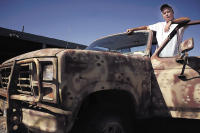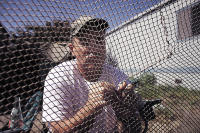 | |||||||||||
|
|
|
|
|
|
|
||||||
|
| |||||||||||
 June 17, 2010 Pelagic Shark foundation teams with Hopkins Marine Station to track basking sharks in Monterey Bayby Alia Wilson
SANTA CRUZ -- Twenty years after he founded the Pelagic Shark Research Foundation after spotting an injured basking shark, Sean Van Sommeran is getting back to his roots by ramping up the nonprofit organization's basking shark tagging efforts. The organization, in collaboration with Stanford's Hopkins Marine Station -- the country's oldest West Coast marine lab -- landed an internal National Oceanic and Atmospheric Administration grant for basking shark research this week. Steven G. Wilson of Stanford's Hopkins Marine Station applied for a grant with another scientist and Van Sommeran. The three will co-author a study of basking sharks in the Monterey Bay area, Van Sommeran said. While basking sharks had never been tagged with transmitters in the Pacific until recently, Monterey Bay is considered a potential basking shark hot spot as there was a former commercial and sport harpoon fishery for baskers in the bay until they went commercially extinct in the mid-1950s, Van Sommeran added. Despite nearly 50 years of not being fished, the population of basking sharks remains relatively low along the California coast, Van Sommeran said. A basking shark was found and tagged in Southern California near the Coronado Islands earlier this month by researchers with NOAA fisheries. The sharks are found around the world but are seen mostly near shore in warm waters. They often feed along the San Diego coast, where there is ample plankton to eat, Wilson said. Before the June 6 tagging, a basking shark had never been tagged in the Pacific Ocean, Van Sommeran said. Wilson, who declined to say how much the NOAA grant is for, said it will cover the costs of three electronic tags and several days of boat and spotter aircraft time. "The tags will be deployed from one of Sean's boats and the grant would cover his fuel and personnel costs," Wilson said. "I'm looking forward to working with Sean and we hope to use the funds to learn more about the habits and habitats of a California native that may be at risk." The Pelagic Shark Research Foundation, based in Moss Landing, has tracked and tagged sharks including great whites for 20 years. "It's a really important opportunity to gather information," Van Sommeran said. "We hope to get tags out this first year." Original URL (may no longer function): http://www.santacruzsentinel.com/localnews/ci_15314934
Copyright © Santa Cruz Sentinel. All rights reserved. |
 Sean Van Sommeran, executive director of the Pelagic Shark Research Foundation, stands on his "Sloughfari" truck Friday at the Elkorn Slough National Estuarine Research Reserve. The Ford F-250, painted to look like a leopard shark, is the organization's main tool to explore the Elkorn Slough, conducting surveys on the shark population. (Romain Fonsegrives/Sentinel)  Sean Van Sommeran repairs his beach sand net, which unharmfully catches the sharks the Pelagic Shark Research Foundation studies. The organization, advocating for marine wildlife protection and fishing regulation, has been monitoring shark populations in the Santa Cruz region for 20 years. (Romain Fonsegrives/Sentinel)  Sean Van Sommeran flushes out his outboard motor. Equipment maintenance is essential to limit the impact of the Pelagic Shark Research Foundation's surveying missions on the Elkorn Slough. (Romain Fonsegrives/Sentinel) |
| |
[ home ] | [ contact us ] | [ support us ] | [ shop ] | © Copyright 1990-2009 PSRF All rights reserved. |
Site Development by IT Director |